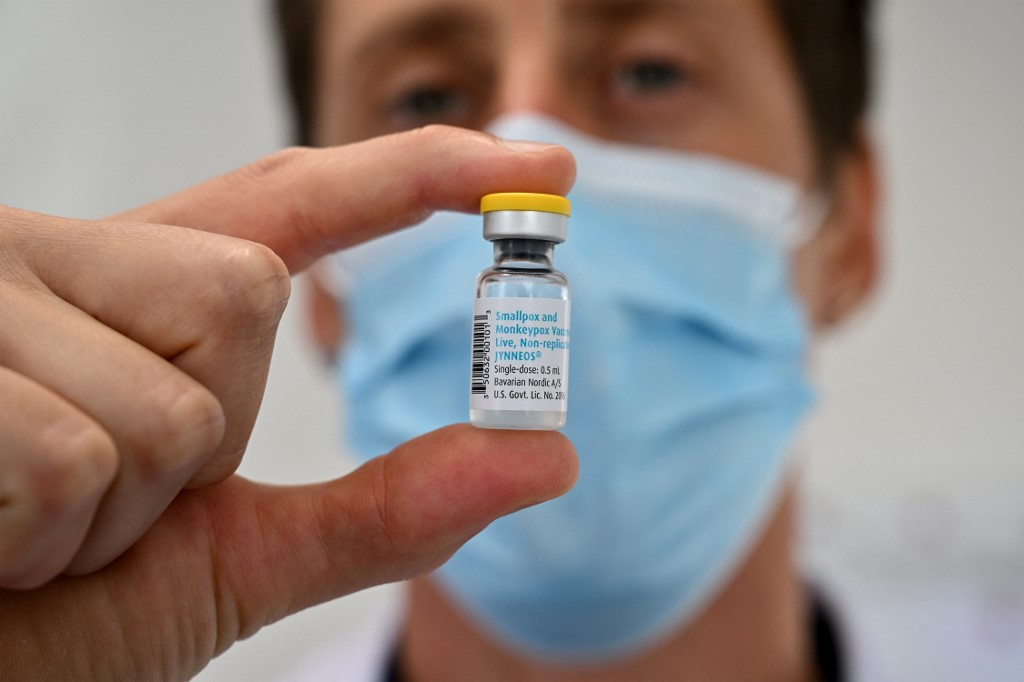Popular Reads
Top Results
Can't find what you're looking for?
View all search resultsPopular Reads
Top Results
Can't find what you're looking for?
View all search resultsWHO declares mpox a global health emergency
Worried by the rise in cases in the Democratic Republic of Congo and the spread to nearby countries, the WHO hastily convened a meeting of experts to study the outbreak.
Change text size
Gift Premium Articles
to Anyone
T
he World Health Organization on Wednesday declared the mpox surge in Africa a global public health emergency, sounding its highest possible alarm over the worsening situation.
Worried by the rise in cases in the Democratic Republic of Congo and the spread to nearby countries, the WHO hastily convened a meeting of experts to study the outbreak.
"Today, the emergency committee met and advised me that in its view, the situation constitutes a public health emergency of international concern. I have accepted that advice," WHO chief Tedros Adhanom Ghebreyesus told a press conference.
A PHEIC is the highest level of alarm under the International Health Regulations, which are legally binding on 196 countries.
"The detection and rapid spread of a new clade of mpox in eastern DRC, its detection in neighboring countries that had not previously reported mpox, and the potential for further spread within Africa and beyond is very worrying," said Tedros.
"It's clear that a coordinated international response is essential to stop these outbreaks and save lives.
"This is something that should concern us all."
The UN health agency's decision comes the day after the African Union's health watchdog declared its own public health emergency over the growing outbreak.
Tedros said the more than 14,000 cases and 524 deaths reported so far this year in DR Congo had already exceeded last year's total.
"The emergence last year and rapid spread of clade 1b in DRC, which appears to be spreading mainly through sexual networks, and its detection in countries neighboring DRC is especially concerning," he said, citing Burundi, Kenya, Rwanda and Uganda.
Dimie Ogoina, who chaired the emergency committee, said the 15 members present unanimously thought the mpox upsurge was an extraordinary event.
He said many members feared the known situation in Africa was "actually the tip of the iceberg", because without more robust surveillance, "we don't have the full picture".
Maria Van Kerkhove, the WHO's epidemic and pandemic preparedness and prevention director, insisted: "We can stop transmission of mpox with a concerted effort."
But she said experts needed a "much better understanding of the epidemiology" and the transmission patterns, which would help make sure the limited number of vaccines could be deployed to best effect.
Two vaccines for mpox are recommended by WHO immunization experts.
Formerly called monkeypox, the virus was first discovered in humans in 1970 in what is now the DRC.
Mpox is an infectious disease caused by a virus transmitted to humans by infected animals but can also be passed from human to human through close physical contact.
The disease causes fever, muscular aches and large boil-like skin lesions.
It is the second PHEIC in succession on mpox -- albeit one focused on a different, and more deadly, strain of the virus.
In May 2022, mpox infections surged worldwide, mostly affecting gay and bisexual men, due to the clade 2b subclade.
The WHO declared a public health emergency which lasted from July 2022 to May 2023. The outbreak, which has now largely subsided, caused some 140 deaths out of around 90,000 cases.
The clade 1b subclade, which has been surging in the DRC since September 2023, causes more severe disease than clade 2b, with a higher fatality rate.
A PHEIC has only been declared seven times previously since 2009: over H1N1 swine flu, poliovirus, Ebola, Zika virus, Ebola again, Covid-19 and mpox.
Marion Koopmans, director of the Pandemic and Disaster Management Centre at Erasmus University Rotterdam, said a PHEIC declaration raises the alert globally.
But "the same priorities remain: investing in diagnostic capacity, public health response, treatment support and vaccination", she said, warning that this would be a challenge as the DRC and its remains are lacking resources.
The International Federation of Red Cross and Red Crescent Societies said it was scaling up preparedness measures across Africa, notably in the heavily affected eastern DRC.
With its broad network, the IFRC said it was prepared to "play a crucial role in containing the spread of the disease, even in the hard-to-reach areas where the need is the greatest".











